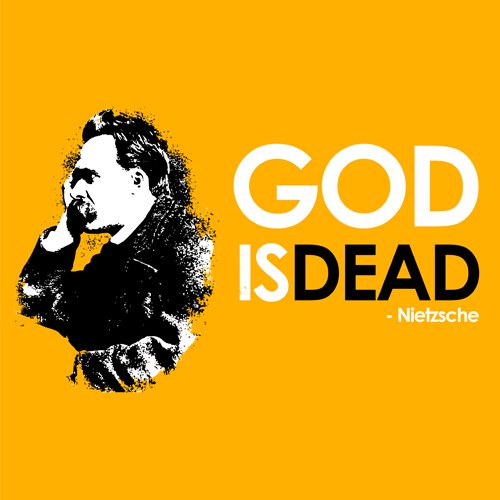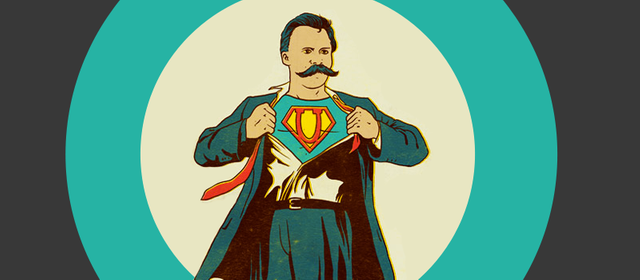
One of Friedrich Nietzsche’s most famous quotes is “God is dead”, but what did he mean with it?
The proclamation that God is dead appears in several of Nietzsche’s works. The most important passage in which he discusses the death of God can be found in aphorism 125 of The Gay Science (1882) entitled “The madman”. The funny, but absurd and wise passage describes a madman who, in clear daylight, visits the market place in order to look for God and to announce that we have killed Him. He compares His death with the drinking up of the sea, the erasing of the horizon, and the disconnecting of the Earth from its Sun. Nietzsche writes:
Have you ever heard of the madman who on a bright morning lighted a lantern and ran to the market-place calling out unceasingly: "I seek God! I seek God!" - As there were many people standing about who did not believe in God, he caused a great deal of amusement. Why! is he lost? said one. Has he strayed away like a child? said another. Or does he keep himself hidden? Is he afraid of us? Has he taken a sea-voyage? Has he emigrated? - the people cried out laughingly, all in a hubbub. The insane man jumped into their midst and transfixed them with his glances. "Where is God gone?" he called out. "I mean to tell you! We have killed him, - you and I! We are all his murderers! But how have we done it? How were we able to drink up the sea? Who gave us the sponge to wipe away the whole horizon? What did we do when we loosened this earth from its sun? Whither does it now move? Whither do we move? Away from all suns? Do we not dash on unceasingly? Backwards, sideways, forewards, in all directions? Is there still an above and below? Do we not stray, as through infinite nothingness? Does not empty space breathe upon us? Has it not become colder? Does not night come on continually, darker and darker? Shall we not have to light lanterns in the morning? Do we not hear the noise of the grave-diggers who are burying God? Do we not smell the divine putrefaction? - for even Gods putrefy! God is dead! God remains dead! And we have killed him! How shall we console ourselves, the most murderous of all murderers?
How did we kill God?
Nietzsche believes that God is dead, because the Christian religion has become incredible. People’s loss of religious belief in Western Europe was already visible in the ideas of many intellectuals. Marx had for example declared religion to be the opium of the masses, and Darwin’s theory of evolution had raised serious questions regarding the Bible’s authority. Hence, the proclamation that “God is dead” should not be taken literally, but figuratively. Nietzsche is crystal clear that this is how it should be interpreted at the start of aphorism 343 of The Gay Science:
The most important of more recent events - that "God is dead," that the belief in the Christian God has become unworthy of belief - already begins to cast its first shadows over Europe.
What's the consequence of the death of God?
Nietzsche himself did not believe in God. Nonetheless, Nietzsche describes a troublesome future for our loss of religion as it would result in the collapse of European morality. He writes in aphorism 343:
… so much was built upon it, so much rested on it, and had become one with it: for example, our entire European morality. This lengthy, vast and uninterrupted process of crumbling, destruction, ruin and overthrow which is now imminent: who has realised it sufficiently today to have to stand up as the teacher and herald of such a tremendous logic of terror, as the prophet of a period of gloom and eclipse, the like of which has probably never taken place on earth before?
Nietzsche believed that the death of God would introduce a period of nihilism – a period of absurdity where people have no order, no truth, and no goals or ideals to pursue as the protective and meaning-to-life giving character of religion has disappeared.
How shall we console ourselves, the most murderous of all murderers?
Nietzsche proposes a new way of life. One in which we create our own values in a life-affirming manner. In a future post, I will discuss Nietzsche's views of how we should console ourselves with the death of God and how we should deal with nihilism.

Reference
Nietzsche, F. (1882). The Gay Science.
Nice article
Downvoting a post can decrease pending rewards and make it less visible. Common reasons:
Submit
Thanks, Lem! :)
Downvoting a post can decrease pending rewards and make it less visible. Common reasons:
Submit
He means that he is terrified about how the 20th century would look. So was Dostoyevsky.
Downvoting a post can decrease pending rewards and make it less visible. Common reasons:
Submit
God is and he is alive! do not believe in God, why then live. I believe in God and I know that he will not leave me in trouble.
Downvoting a post can decrease pending rewards and make it less visible. Common reasons:
Submit
Well... I don't believe in God. Do you want me to die then?
Downvoting a post can decrease pending rewards and make it less visible. Common reasons:
Submit
Many people now don't want truth, they want to hear what they want to hear. People are their own gods now. The state of the world we live in is due to exactly that; people want to be their own gods. When you first mentioned that quote from Nietzsche I took it literal but it's cool that you broke down what he was trying to say. Christianity for the most part has been hijacked by falsehoods. THere are many people who mean well but are teaching in error. Christianity is not about a religion it is a way of living life that leads to ultimate fulfillment only through the Messiah. Lastly, the eternal cannot die.
Downvoting a post can decrease pending rewards and make it less visible. Common reasons:
Submit
Nietzsche would definitely agree with this statement. Although he is an atheist, he is remarkably mild about Jesus Christ in The Antichrist (1895). He thought that this new way of life that Christ had imagined became hijacked by the Christian priests and his apostles.
I may write about this in a future post.
Downvoting a post can decrease pending rewards and make it less visible. Common reasons:
Submit
Perhaps he meant that we have lost a sense of higher purpose?
I would suggest that we have entered an age of greed.
You could certainly find no end of people whose religion has become the accumulation of material things. They would certainly feel they have order, truth and goals, and they've probably got a spreadsheet to track them and calculate prophets and losses.
Downvoting a post can decrease pending rewards and make it less visible. Common reasons:
Submit
Yes, that's exactly what Nietzsche means. I'm sorry for not making it all too clear. The loss of a sense of higher purpose is what he calls 'passive nihilism', and Nietzsche would urge us to overcome it by finding our own higher purpose.
He warns us that we would enter an age of greed, but also an age where mediocrity prevails and the outstanding are trampled upon, an age of relativism where everything is equally good and where people feel good about themselves but are unable to create their own values - sheep people.
Let's see if I can pen down a new post to clarify this.
Downvoting a post can decrease pending rewards and make it less visible. Common reasons:
Submit
I think you just did @chhaylin ;-)
And we seem to have drifted right into the very situation you described.
I don't suppose Nietzsche offered suggestions on how to correct that?
Or would that have been too easy for him? i.e. No rewards/growth without struggle.
Downvoting a post can decrease pending rewards and make it less visible. Common reasons:
Submit
Nietzsche offered suggestions. He wrote how we could find our authenticity, and how we can build our own values. He described it in quite valorous terms. He was extremely concerned with our society, and gave us some ideas on how we could become a 'higher type of man' - the Ubermensch. Part of it is indeed to learn to overcome our struggles, because there's only rewards/growth through struggles.
Downvoting a post can decrease pending rewards and make it less visible. Common reasons:
Submit
All you ever seem to hear about Nietzsche is the "that which does not kill me..." quote.
Downvoting a post can decrease pending rewards and make it less visible. Common reasons:
Submit
Or this... ;)
Downvoting a post can decrease pending rewards and make it less visible. Common reasons:
Submit
That's better.
;-)
Downvoting a post can decrease pending rewards and make it less visible. Common reasons:
Submit
You mean this ;)
Downvoting a post can decrease pending rewards and make it less visible. Common reasons:
Submit
I hadn't even made that connection.
He totally ripped her song off. ;-)
Downvoting a post can decrease pending rewards and make it less visible. Common reasons:
Submit
You mean this ...
Downvoting a post can decrease pending rewards and make it less visible. Common reasons:
Submit
Nope, definitely NOT that. ;-)
Downvoting a post can decrease pending rewards and make it less visible. Common reasons:
Submit
Niet is very good!
Downvoting a post can decrease pending rewards and make it less visible. Common reasons:
Submit
Yeah, a very interesting figure in philosophy.
Downvoting a post can decrease pending rewards and make it less visible. Common reasons:
Submit
Congratulations @chhaylin! You have completed some achievement on Steemit and have been rewarded with new badge(s) :
Click on any badge to view your own Board of Honor on SteemitBoard.
For more information about SteemitBoard, click here
If you no longer want to receive notifications, reply to this comment with the word
STOPDownvoting a post can decrease pending rewards and make it less visible. Common reasons:
Submit
Great post. Following!
Downvoting a post can decrease pending rewards and make it less visible. Common reasons:
Submit
Thanks! :)
Downvoting a post can decrease pending rewards and make it less visible. Common reasons:
Submit
Nice post.
I also wrote down my thoughts on Nietzsche. Check it out
https://steemit.com/philosophy/@seczenith/become-who-you-are-nietzsche-s-philosophy-is-made-for-the-21st-century
Downvoting a post can decrease pending rewards and make it less visible. Common reasons:
Submit